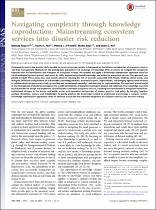 ResearchSpace
ResearchSpace
Navigating complexity through knowledge coproduction: Mainstreaming ecosystem services into disaster risk reduction
JavaScript is disabled for your browser. Some features of this site may not work without it.
- ResearchSpace
- →
- Research Publications/Outputs
- →
- Journal Articles
- →
- View Item
| dc.contributor.author |
Reyers, B

|
|
| dc.contributor.author |
Nel, JL

|
|
| dc.contributor.author |
O'Farrell, Patrick J

|
|
| dc.contributor.author |
Sitas, Nadia E

|
|
| dc.contributor.author |
Nel, DC

|
|
| dc.date.accessioned | 2016-10-13T13:04:21Z | |
| dc.date.available | 2016-10-13T13:04:21Z | |
| dc.date.issued | 2015-06 | |
| dc.identifier.citation | Reyers, B., Nel, J.L., O’Farrell, P.J., Sitas, N. and Nel, D.C. 2015. Navigating complexity through knowledge coproduction: Mainstreaming ecosystem services into disaster risk reduction. Proceedings of the National Academy of Sciences of the United States of America, 112(24), 7362–7368 | en_US |
| dc.identifier.issn | 0027-8424 | |
| dc.identifier.uri | http://www.pnas.org/content/112/24/7362.full.pdf | |
| dc.identifier.uri | http://hdl.handle.net/10204/8816 | |
| dc.description | Copyright: 2015 PNAS | en_US |
| dc.description.abstract | Achieving the policy and practice shifts needed to secure ecosystem services is hampered by the inherent complexities of ecosystem services and their management. Methods for the participatory production and exchange of knowledge offer an avenue to navigate this complexity together with the beneficiaries and managers of ecosystem services. We develop and apply a knowledge coproduction approach based on social-ecological systems research and assess its utility in generating shared knowledge and action for ecosystem services. The approach was piloted in South Africa across four case studies aimed at reducing the risk of disasters associated with floods, wildfires, storm waves, and droughts. Different configurations of stakeholders (knowledge brokers, assessment teams, implementers, and bridging agents) were involved in collaboratively designing each study, generating and exchanging knowledge, and planning for implementation. The approach proved useful in the development of shared knowledge on the sizable contribution of ecosystem services to disaster risk reduction. This knowledge was used by stakeholders to design and implement several actions to enhance ecosystem services, including new investments in ecosystem restoration, institutional changes in the private and public sector, and innovative partnerships of science, practice, and policy. By bringing together multiple disciplines, sectors, and stakeholders to jointly produce the knowledge needed to understand and manage a complex system, knowledge coproduction approaches offer an effective avenue for the improved integration of ecosystem services into decision making. | en_US |
| dc.language.iso | en | en_US |
| dc.publisher | PNAS | en_US |
| dc.relation.ispartofseries | Workflow;16486 | |
| dc.subject | Boundary work | en_US |
| dc.subject | Natural hazards | en_US |
| dc.subject | Participatory research | en_US |
| dc.subject | Regulating services | en_US |
| dc.subject | Resilience | en_US |
| dc.title | Navigating complexity through knowledge coproduction: Mainstreaming ecosystem services into disaster risk reduction | en_US |
| dc.type | Article | en_US |
| dc.identifier.apacitation | Reyers, B., Nel, J., O'Farrell, P. J., Sitas, N. E., & Nel, D. (2015). Navigating complexity through knowledge coproduction: Mainstreaming ecosystem services into disaster risk reduction. http://hdl.handle.net/10204/8816 | en_ZA |
| dc.identifier.chicagocitation | Reyers, B, JL Nel, Patrick J O'Farrell, Nadia E Sitas, and DC Nel "Navigating complexity through knowledge coproduction: Mainstreaming ecosystem services into disaster risk reduction." (2015) http://hdl.handle.net/10204/8816 | en_ZA |
| dc.identifier.vancouvercitation | Reyers B, Nel J, O'Farrell PJ, Sitas NE, Nel D. Navigating complexity through knowledge coproduction: Mainstreaming ecosystem services into disaster risk reduction. 2015; http://hdl.handle.net/10204/8816. | en_ZA |
| dc.identifier.ris | TY - Article AU - Reyers, B AU - Nel, JL AU - O'Farrell, Patrick J AU - Sitas, Nadia E AU - Nel, DC AB - Achieving the policy and practice shifts needed to secure ecosystem services is hampered by the inherent complexities of ecosystem services and their management. Methods for the participatory production and exchange of knowledge offer an avenue to navigate this complexity together with the beneficiaries and managers of ecosystem services. We develop and apply a knowledge coproduction approach based on social-ecological systems research and assess its utility in generating shared knowledge and action for ecosystem services. The approach was piloted in South Africa across four case studies aimed at reducing the risk of disasters associated with floods, wildfires, storm waves, and droughts. Different configurations of stakeholders (knowledge brokers, assessment teams, implementers, and bridging agents) were involved in collaboratively designing each study, generating and exchanging knowledge, and planning for implementation. The approach proved useful in the development of shared knowledge on the sizable contribution of ecosystem services to disaster risk reduction. This knowledge was used by stakeholders to design and implement several actions to enhance ecosystem services, including new investments in ecosystem restoration, institutional changes in the private and public sector, and innovative partnerships of science, practice, and policy. By bringing together multiple disciplines, sectors, and stakeholders to jointly produce the knowledge needed to understand and manage a complex system, knowledge coproduction approaches offer an effective avenue for the improved integration of ecosystem services into decision making. DA - 2015-06 DB - ResearchSpace DP - CSIR KW - Boundary work KW - Natural hazards KW - Participatory research KW - Regulating services KW - Resilience LK - https://researchspace.csir.co.za PY - 2015 SM - 0027-8424 T1 - Navigating complexity through knowledge coproduction: Mainstreaming ecosystem services into disaster risk reduction TI - Navigating complexity through knowledge coproduction: Mainstreaming ecosystem services into disaster risk reduction UR - http://hdl.handle.net/10204/8816 ER - | en_ZA |





